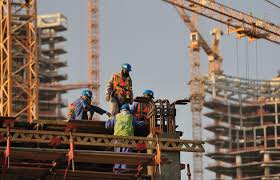By Andrew Warshaw
March 17 – Qatar’s World Cup organisers, buffeted by constant attacks about the country’s human rights record, have gone on the offensive by branding the latest report into the mistreatment of workers as a smear campaign “riddled with factual errors”.
The Gulf state has been under mounting pressure to improve the living conditions of migrant workers building the infrastructure for 2022 and to reform the antiquated kafala system of tied employment.
Until now, 2022 officials have been relatively restrained when it comes to reacting to criticism, acknowledging workers’ rights shortcomings and insisting improvements will be put in place.
But with FIFA’s executive committee addressing the highly sensitive issue at a key meeting later this week, Qatar have been quick to respond to a new survey by the International Trade Union Confederation.
The ITUC said its general secretary, Sharan Burrow, found during a recent site visit to Al-Wakrah, Qatar’s first World Cup venue being constructed, that “38 World Cup workers from India, Nepal and Thailand (are) living in squalor with mattresses on the floor in makeshift rooms underneath the bleachers or stadium seats.”
“Qatar is a government which takes no responsibility for workers, and its response to public criticism is focused on public relations,” Burrow added.
But in a hard-hitting response, Qatar’s Supreme Committee for Delivery and Legacy said the ITUC report was factually inaccurate and was a deliberate attempt to “discredit the positive work” that is being done.
The committee acknowledged the “far-reaching and extremely complex” challenges but attacked an entire section of the ITUC report as being “littered with factual errors.”
The Qataris claim the ITUC report referred to accommodation not being used by construction workers, adding that they were in fact being housed in refurbished accommodation which the ITUC never visited or requested to do so.
Qatar in February published a detailed set of guidelines aimed at protecting the rights of thousands of expatriate workers employed on its construction projects. The same month, the Indian embassy in Doha was reported as saying 450 of its nationals had died in almost two years in Qatar whilst an official at the Nepalese embassy told AFP in January that 191 deaths had been registered in 2013, many of them from “unnatural” heart failure.
But World Cup organisers said significant measures were being adopted to meet international employment standards and denounced the ITUC’s anti-Qatar agenda.
“Our Workers’ Welfare Standards clearly regulate working and living conditions and are being implemented on our first stadium and accommodation sites… Since January 2014, the Supreme Committee’s Workers’ Welfare Committee has conducted three successful inspections to enforce and monitor this implementation,” their statement said.
“The International Trade Union Confederation’s statement that our standards have no credible enforcement mechanism is hence both incorrect and misleading.
“We know that there are issues. While this process of change is not something that can be achieved overnight, we have the will and the commitment to see it through.”
Contact the writer of this story at moc.l1744702353labto1744702353ofdlr1744702353owedi1744702353sni@w1744702353ahsra1744702353w.wer1744702353dna1744702353

